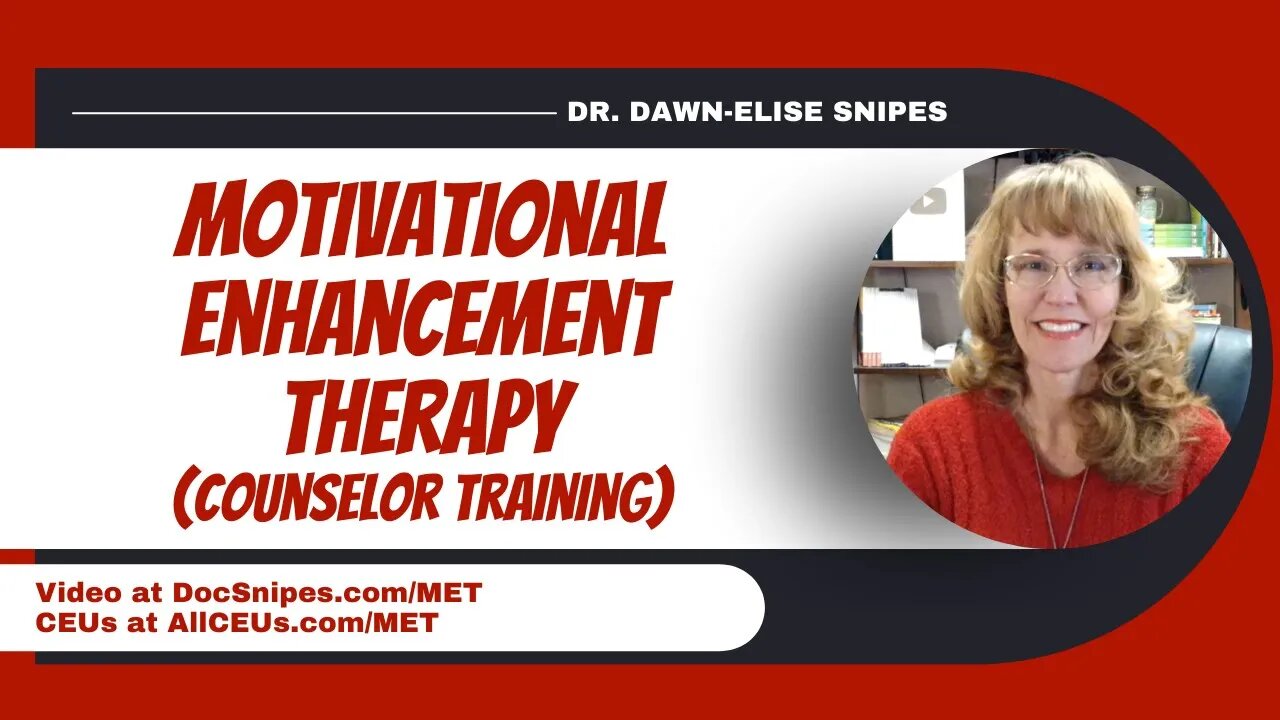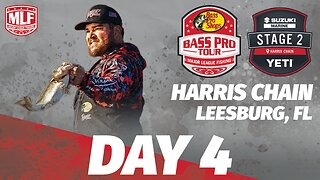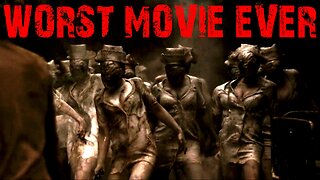Premium Only Content

Motivational Enhancement, Motivational Interviewing and Stages of Change | CBT Therapist Aid
Dr. Dawn-Elise Snipes is a Licensed Professional Counselor and Qualified Clinical Supervisor. She received her PhD in Mental Health Counseling from the University of Florida in 2002. In addition to being a practicing clinician, she has provided training to counselors, social workers, nurses and case managers internationally since 2006 through AllCEUs.com Motivational Enhancement Therapy, #MotivationalInterviewing and #StagesofChange | CBT Therapist Aid #SAMHSA
📢SUBSCRIBE and click the BELL to get notified when new videos are uploaded.
💲 AllCEUs.com Unlimited continuing education CEUs $59
💻 Online course based on this video can be found at https://www.allceus.com/member/cart/index/product/id/617/c/
⭐ Specialty Certificate Programs for Case Management and Counselor Certification beginning at $89 https://AllCEUs.com/certificate-tracks
Join this channel to get access to perks:
https://www.youtube.com/channel/UCAE3JJi8tX7gfhZEXCUGd_A/join
NOTE: ALL VIDEOS are for educational purposes only and are NOT a replacement for medical advice or counseling from a licensed professional.
Video by Dr. Dawn Elise Snipes on integrative behavioral health approaches including counseling techniques and skills for improving mental health and reducing mental illness.
MET Unique Characteristics
~ Emphasis on personal choice regarding future behavior
~ Objective evaluation focused on eliciting the CLIENT’s OWN concerns
~ Resistance is an interpersonal behavior pattern indicating failure to accurately empathize
~ Resistance is met with reflection
Motivational Enhancement Therapists Do NOT
~ Argue with clients
~ Impose diagnostic labels
~ Tell clients what they “must” do
~ Seek to “break down” denial through direct confrontation
~ Imply client’s powerlessness
OARS
~ Open Ended Questions
~ Affirmations
~ Reflective Listening
~ Summaries
Stages of Change
~ Motivation needs to be enhanced and maintained in all stages of change
~ Stages
~ Precontemplation
~ Contemplation
~ Preparation
~ Action
~ Maintenance
Basic Principles: EE-DD-AA-RR-SS
~ Express Empathy
~ Reflective listening (accurate empathy) is a key skill
~ Develop Discrepancy
~ Perceive a discrepancy between where they are and where they want to be
~ Raise clients’ awareness of the personal consequences of their drinking in order to precipitate a crisis increasing motivation for change
~ Avoid Arguing
~ No attempt is made to have the client accept or “admit” a problem
Basic Principles cont…
~ Roll with resistance
~ New ways of thinking about problems are invited but not imposed.
~ Ambivalence is viewed as normal, not pathological, and is explored openly.
~ Solutions are usually evoked from the client rather than provided by the therapist
~ Support self-efficacy
~ People will not try to change unless they believe there is HOPE for success
CBT vs. MET
Cognitive Behavioral
~ Assumes client is motivated
~ Identify and modify maladaptive cognitions
~ Prescribes change strategies
Motivational Enhancement
~ Builds client motivation
~ Explores and reflects client perception without correcting
~ Elicits change strategies from the client
AllCEUs courses for counselor continuing education are accepted in most states because we are an approved education provider for NAADAC, the States of Florida and Texas Boards of Social Work and Mental Health/Professional Counseling, the California Consortium for Addiction Professionals and Professions, the Australian Counselling Association, CRCC, Canadian Counselling and Psychotherapy Association and more.
Dr. Dawn-Elise Snipes teaches adults how to use cognitive behavioral therapy tools for building resilience at work, among staff and in children.
Many of the skills in the videos are the same ones that are taught in a basic counselling course and can be used as a CBT therapist aid. CBT techniques are helpful tools for self counseling for major depressive disorder, anger management, confidence, self esteem, anxiety, abandonment issues, self improvement
TIMESTAMPS
00:00 Introduction and objectives
00:45 What is motivational enhancement therapy
04:35 Unhelpful ineffective responses to resistance
10:10 How do therapists use motivational interviewing in motivational enhancement therapy
11:35 FRAMES and OARS approach in motivational interviewing
20:15 Stages of Change Transtheoretical Model
35:02 Questions to increase intrinsic motivation
-
 2:40
2:40
DocSnipes
1 year agoWhy SMART Goal Setting Doesn't Work
134 -
 8:34
8:34
Mike Rowe
6 days agoWhat You Didn't Hear At Pete's Confirmation Hearing | The Way I Heard It with Mike Rowe
10.9K14 -
 LIVE
LIVE
TonYGaMinG
7 hours ago🟢LIVE NOW! KINGDOM COME DELIVERANCE 2 / NEW EMOTES / BLERPS #RumbleGaming
1,079 watching -
 40:17
40:17
SLS - Street League Skateboarding
4 days agoEVERY 9 CLUB IN FLORIDA! Looking back at SLS Jacksonville 2021 & 2022 - Yuto, Jagger, Sora & more...
70.3K1 -
 2:00:47
2:00:47
PaddysParlorGames
16 hours agoSunday Parlor Chill: GOBSTEIN
43K2 -
 LIVE
LIVE
Major League Fishing
4 days agoLIVE! - Bass Pro Tour: Stage 2 - Day 4
135 watching -
 56:24
56:24
Russell Brand
1 day agoEddie Gallagher: War, Betrayal & Fighting the System
105K12 -
 11:21
11:21
TimcastIRL
8 hours agoGOP Rep Says TWO SHOOTERS In JFK Assassination As FBI Uncovers TROVE Of Secret Documents
122K175 -
 1:04:55
1:04:55
Bare Knuckle Fighting Championship
4 days agoBKFC ITALY PRESS CONFERENCE | LIVE!
75.6K7 -
 10:04
10:04
Space Ice
6 hours agoThe Movie Silent Hill Is Like Resident Evil Without The Good Parts - Worst Movie Ever
43.8K12